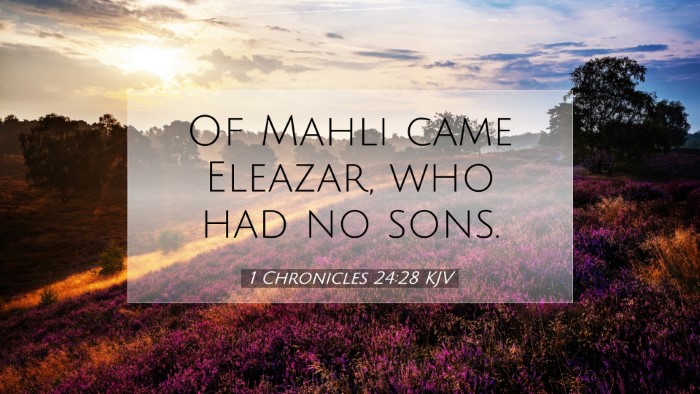Commentary on 1 Chronicles 24:28
1 Chronicles 24:28 states: "The son of Abijah; the son of Ahitub; the son of Ahimelech; the son of Abiathar; the son of Eli." This verse is part of the genealogy of the priests as enumerated in the first book of Chronicles, focusing on the lineage and duties of the Levites and priests within Israel.
Contextual Analysis
To understand 1 Chronicles 24:28, it is necessary to appreciate the historical and theological context in which it is situated. The chapters preceding this verse lay out the divisions of the priesthood established during the reign of David, emphasizing the organized structure and continuity of worship in Israel.
Genealogy and Its Importance
Genealogies in the Bible serve multiple purposes:
- Establishing Legitimacy: They provide the basis for priesthood legitimacy, showing that the priests descended from Aaron, the first high priest.
- Covenantal Continuity: These lists remind the readers of God’s covenant with His people, which is maintained through generations.
- Historical Identity: They serve as a historical record, exposing the lineage that links current practices back to foundational figures in Israelite religion.
Insights from Matthew Henry
Matthew Henry emphasizes the significance of the priestly line, particularly mentioning the roles of the descendants of Abijah in the priestly service. He notes:
"The mention of Abijah’s descendants illustrates the faithfulness of God in preserving the priestly line to accomplish His purposes. As God assigned duties to the priests, it reflected His desire for order and reverence in worship."
Henry also points to the spiritual legacy inherited by these individuals, urging modern readers to value their spiritual heritage and responsibilities within the church.
Insights from Albert Barnes
Albert Barnes provides a more detailed exploration of the mechanics and responsibilities associated with the priesthood. He notes:
"The role of the descendants of Abijah, as specified in this chapter, indicates their responsibilities during specific times of worship, which promotes the organization of religious duties in the temple."
Barnes elucidates the historical setting of temple practices, reinforcing the disciplined approach to maintaining a holy service that was expected of these priests. He signifies the importance of accountability in ministry that is highlighted through these genealogies.
Insights from Adam Clarke
Adam Clarke approaches this text with an emphasis on the theological implications. He remarks:
"The naming of Abiathar’s lineage acts not only as a historical account but also serves as a warning against the consequences of disobedience, as seen in the narrative of Abiathar himself and his eventual failure."
Clarke highlights the cautionary tales embedded in genealogies, where success and failure intertwine within the legacy of each priest. This reflection is particularly pertinent for those in ministry today, reminding them of the importance of faithfulness in their calling.
Theological Implications
The verse can be viewed as a profound reminder of how God orchestrates His plans through specific lineages and how He continues to work through descendants:
- Divine Sovereignty: The organization of the Levitical priesthood seeks to illustrate God's sovereignty in maintaining His worship.
- Continuity of Worship: The structured approach to worship demonstrates God's desire for order and reverence, providing a model for contemporary practices.
- Community Identity: By identifying with these ancestral lines, believers today can find a sense of belonging and understanding of their spiritual heritage.
Application for Today
For pastors, students, theologians, and Bible scholars, the insights gathered from this verse and the commentaries might consider:
- Personal Reflection: How does one’s spiritual lineage impact their faith and practice?
- Church Structure: What lessons can be drawn from the organizational principles of the priesthood?
- Faithfulness in Ministry: The importance of maintaining integrity and accountability in spiritual leadership, drawing on the successes and failures of the past.
Conclusion
1 Chronicles 24:28 offers a rich tapestry of insights into the nature of priesthood and divine governance in worship. The marriage of historical context with theological insight fosters a robust understanding that can enrich one's approach to ministry and personal faith.
As we delve deeper into the relevance of these ancient texts, it becomes increasingly vital to apply their lessons to the contemporary church, drawing from the enduring legacy of those who came before us.


